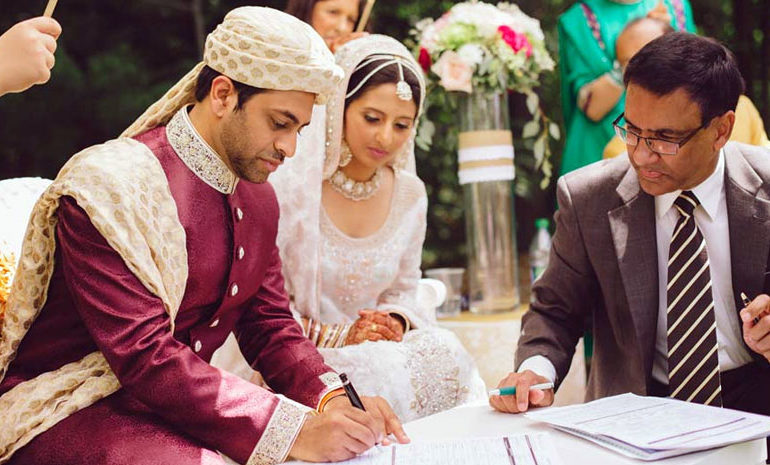Southfield — A recent Michigan Court of Appeals opinion has significant ramifications for agreements between spouses in a religious wedding ceremony.
Roquia Draper, a partner at Warner Norcross + Judd LLP in Southfield, who argued the case at trial and in front of the Michigan Court of Appeals, said that Islamic wedding ceremonies often include a “mahr” similar to a “ketubah” in Jewish wedding ceremonies, both of which include money or property traditionally given by a husband to his wife.
In a recent Michigan case, when a Muslim couple’s marriage dissolved, Draper argued that their mahr agreement should be treated as a contract under state law, in addition to the equitable property distribution of marital assets to which each was entitled.
“The parties were religiously married in 2013,” Draper said. “They went to the Islamic Center of America in front of an imam and got an Islamic marriage license.
“They then got legally married under the laws of the state of Michigan three years later. One of the arguments brought up by the husband during the trial was that the mahr agreement did not have to be fulfilled by him since they did not have valid, legal marriage for some time.”
The trial court disagreed and enforced the mahr agreement as a contract in the divorce proceedings. The husband appealed and the Michigan Court of Appeals reinforced that the mahr agreement constitutes an enforceable contract under Michigan law. This decision sets a binding precedent that these agreements do, in fact, constitute a legal contract so long as they meet the requirements of a legal contract in Michigan.
“At the Court of Appeals level, the argument was made again,” Draper said. “Our position in both instances was that in order for the marriage certificate and mahr agreement to be valid, one only needs to look to the fact that there was an Islamic marriage ceremony.”
Draper argued that the parties entered into the mahr agreement at the time of the Islamic marriage ceremony. Whether there was a subsequent marriage license obtained from the state is irrelevant to the mahr contract itself.
“Initially, when the husband filed a complaint for divorce we filed a counter claim on behalf of the wife,” Draper said. “It was similar to any counter claim in a divorce suit and sought a routine settlement. This includes dividing property and settling issues pertaining to parental rights, as they had a child together.
“We specifically made a claim, in our counter claim, that there’s a contract out there for $50,000. The parties signed it at the Islamic marriage ceremony. We argued that it was a contract under Michigan law and we asked the court to enforce it as part of the divorce action.”
“Mahr agreements are typically different from pre-nuptial agreements since a pre-nuptial outlines the rights, obligations and waivers of the parties in the event of a dissolution of the marriage through divorce or death, whereas the mahr agreements typically provide for an entitlement of one or both parties upon consummation of the religious ceremony,” Draper said.
The decisions by the appeals court ensures that local civil courts have a precedence by which they can preside over agreements made during religious ceremonies. This includes the ketubah in Jewish wedding ceremonies.
“The law is clear on what constitutes a legally binding contract,” Draper said. “And in this case, the mahr agreement fit those requirements, leaving no reasonable explanation for why this contract should be treated any differently than any other legal contract simply because it was entered into ancillary to a religious ceremony. This decision ensures that future mahr and ketubah agreements in Michigan are enforceable contracts.”
The U.S. Supreme Court Jones v. Wolf case showed that religious documents can be entered into rulings in regular civil court without looking further into any religious law. This is called the neutral principles of law concept. Under this concept, the appeals court deemed the mahr to be a contract that had to be fulfilled by the parties involved.
Draper found similar cases in Florida, New Jersey, New York and Texas to support her argument in court. The court ruling has important implications for Muslims marriages in Michigan.
“I’m part of the Muslim community myself,” Draper said. “So far, I have gotten both positive and negative feedback about this decision. Some argue that these ceremonies are performed religiously and it should be up to an imam whether mahr should be enforced after dissolution of marriage.”
Draper said imams most often don’t have any real authority to enforce a mahr. Her team brought in ICOFA’s Sheikh Ibrahim Kazerooni to testify on the behalf of the defendants.
“Kazerooni helped me understand that parties will often enter these agreements under the unrealistic expectation that they will remain binding and enforceable without entering court,” Draper said.
She said that this case can serve as a good lesson for young Muslims who should be careful and scrutinize the viability of these agreements before entering them.
“Be realistic in the obligations you ask of each other and be realistic about the rights under these agreements because, as it turns out, they are indeed enforceable by law,” she added.
A Mahr can be paid in two or more installments. A smaller gift, often called an advanced payment, may be exchanged at the time of the ceremony. A later payment is made at a time agreed upon by both parties.






Leave a Reply